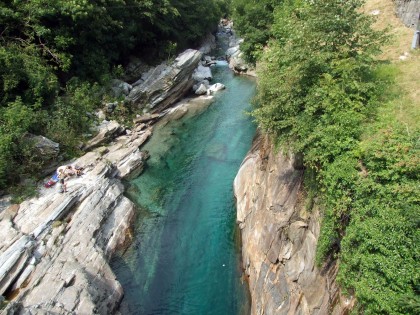The Least I Need to Do
Devra Torres | Jun 10, 2013 | 5 cmts

“What’s the least I need to do to keep you happy?”
That’s an apocryphal (I hope) quote from a new husband, addressed to his bride.
You can predict what sort of marriage is likely to follow, and how long it’s likely to last.
The question is, do we treat God like that? We may feel sure we don’t, but it’s possible to do it inadvertently, even while being convinced we're exemplary Christians.
In one sense, of course, “What must I do to be saved?” (roughly equivalent to “What’s the least I need to do to keep you happy?”) is the most important question a person can ask. If we fail to ask the question, or to live by the answer, we risk eternal misery.
And it is easy these days to fail even to ask the question. As Fr. Michel Esparza points out in Sintonia con Cristo, the very first step is awareness that we bear responsibility for the use we make of our free will. If we haven’t come that far, it won’t even occur to us to ask, say:
- Who can save me?
- How do I obtain pardon for my sins?
- What must I do to ensure that God’s mercy, and not His justice, gets the last word?
This is one giant obstacle to the “new evangelization,” Esparza points out: plenty of people are not yet asking the questions. Whether from lack of formation, from the “anesthesia” of entertainment or escapism; or the “cares of this world,” we have lost the “sense of sin,” as Bl. John Paul II put it. Maybe some of us haven't lost it completely: we retain a vague and uneasy suspicion that God is lying in wait like a traffic cop concealed behind a billboard, hoping to catch us at something He disapproves of.

But as long as no one's asking the question, Esparza notes, those who peddle the Good News are like salesmen for a product that no one believes he needs.
Also, even we who understand the importance of asking “What must I do to be saved?” (and of trying to live according to the answer) need to beware of aiming too low. It’s quite possible to try to keep the commandments not out of a desire to draw closer to God, but just the opposite: an inclination to fend Him off, to avoid attracting His notice. (There's a novel that illustrates this, and I'm pretty sure it's by Flannery O’Connor or Tolstoy, but I can't think what it's called. Any suggestions?) Sometimes we’re trying not so much to keep God happy as to keep Him at a comfortable distance.
As John Paul II says in Veritatis splendor, the “thou shalt not’s” are not to be interpreted legalistically and then treated as the whole story, as if refraining from transgressiong this lower limit is the essence of the Christian life. Here's the interesting part:
There is no upper limit.
If we understood that and communicated it, we who call ourselves Christians would come closer to deserving the name, and a lot of people who are not Christians at all might consider changing that. Here's John Paul II:
The commandments ... are the first necessary step on the journey towards freedom, its starting-point. "The beginning of freedom", Saint Augustine writes, "is to be free from crimes... such as murder, adultery, fornication, theft, fraud, sacrilege and so forth. When once one is without these crimes (and every Christian should be without them), one begins to lift up one's head towards freedom. But this is only the beginning of freedom, not perfect freedom...".
Jesus shows that the commandments must not be understood as a minimum limit not to be gone beyond, but rather as a path involving a moral and spiritual journey towards perfection, at the heart of which is love (cf. Col 3:14).
The same basic idea is expressed by Fr. Robert Barron, when he likens absolute truths—including the truths of the moral law—to the banks of a river.

They place limits on the river, but it’s not as if it would be a freer river if it had no banks at all. In fact, it would cease to flow in any particular direction. It would end up a stagnant, murky, reeking pool, breeding disease, and eventually sinking into the mud. It wouldn’t be itself at all, and it would never get anywhere.

“What’s the least I have to do to keep you happy?” is a little better than nothing. A willingness to refrain from adultery is a good thing. But let's not settle for not being a swamp.

Comments (5)
CATHY ECHANIZ-BECK
Jun 11, 2013 8:26am
Dev,
Were you thinking of Crime & Punishment by Tolstoy??
Cathy
Marilyn Prever
Jun 11, 2013 9:01am
Was it the one about the dying man who couldn't take the first step, which was to admit he was not a good man ad to ask for mercy.The Death of Ivan Ilyich or something like that?
Devra Torres
Jun 11, 2013 10:39am
I'm not sure, but maybe. Ivan Ilyich had his lists of "thou shalt not's," but they all had to do with what was and wasn't done in his social circle. There's something like that in Anna Karenina, too, about how Vronsky stuck to his principles, which were "Never lie, except to a woman," and "Never fail to pay a debt, unless it's a gambling debt," and so on. Crime and Punishment is pretty fuzzy in my mind, Cathy: is there some part in particular you're thinking of?
Katie van Schaijik
Jun 11, 2013 11:53am
I love the reminder that turning away from serious vice is "the beginning of freedom".
The next big liberation, in my experience, is from illusions of rectitude and self-sufficiency. It's the willingness to face and absorb the truth about ourselves—especially our impotence to save ourselves, or even to live well.
It's painful, but definitely freeing.
CATHY ECHANIZ-BECK
Jun 11, 2013 11:55am
Not in particular, Devra. It's kind of fuzzy to me, too. :) Just a general sense I had, of Ivan's feeling guilty and wanting to do better. Ha! I should re-read that one; it was good!